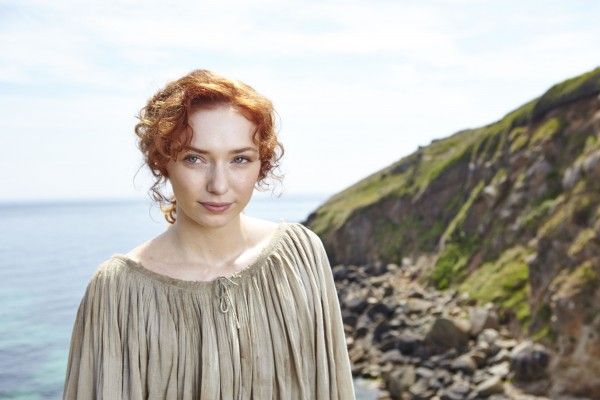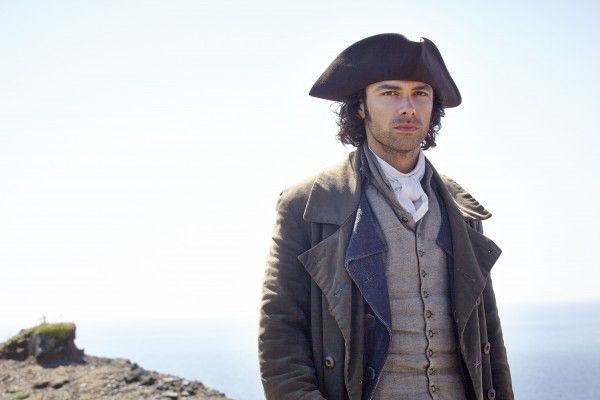One of the things that made Downton Abbey so refreshing when it first premiered on PBS was that it was a wholly new story for American Anglophiles and lovers of costume dramas to sink our teeth into. It looked like any number of a sumptuous adaptations of Jane Austen or Bronte or Dickens, yet the story was finally something different. Though the upcoming 7-part PBS series Poldark is an adaptation of both Winston Graham’s novels and an original PBS series that aired in the mid-1970s, it feels new. It incorporates all of the best parts of a good costume drama (marriage, fortunes, dancing, romance), but also has a fiery drive to it.
In this version, Aidan Turner plays the tall, dark, and handsome Captain Ross Poldark, who we first meet fighting in the American Revolutionary War (whose cause he feels more allied with that his home country’s). Two years after an ambush that seems to leave him for dead, Poldark is able to return to England and his home in Cornwall, where he finds a string of misfortunes awaiting him: his father is dead and his estate is in ruins, and the love of his life, Elizabeth (Heida Reed) is set to marry his cousin Francis (Kyle Soller).
Though the tenants are starving, the fields are barren, the mines are closed, and the gentry of Cornwall are all drowning in debt, Poldark is determined to find a way to live off of the land he has inherited, and even finds the means to help other wayward souls along the way (including a young girl he saves from an abusive family, Demelza, played by Eleanor Tomlinson). Though a gambler and a fighter, Poldark is also quickly (but naturally) established as a man with a solid moral compass. He’s the badass rogue with the heart of gold, and that sound you may be hearing on Sunday nights for the next 7 weeks will be of women across the country sighing and swooning over their new crush.
But Poldark is the kind of show that should appeal to just about everyone. The Poldark family name affords Ross some status among the gentry and sends him to balls, even though he’s also the sort who’s more than willing to help his tenants thatch their roofs, investigate a disused mine, and get into a few scrapes along the way. It allows the show to flow between the classes, exploring all of the facets of life in Cornwall.
Ross has many people calling him a friend, but few he truly sees as allies. Other than a sweet and honest relationship with his cousin Verity (Ruby Bentall), Ross is largely at odds with the world, even when there are so many who adore him. He’s tormented by Elizabeth’s decision to move on, and is constantly battling the paranoid will of his uncle (the late Warren Clarke) and the machinations of the town’s moneylenders, like the upwardly mobile Warleggens. He’s tough and a little gruff, but he always seems to do what’s right.
Poldark is not as uniformly sumptuous in its style as Downton Abbey, but it captures life in the late 18th century along the English coast in a way that is both beautiful and tangible. Poldark is also just a grittier tale — there’s more fighting, more blood, and far more of a long-form narrative arc than Downton Abbey has ever had. But Poldark is still full of dramatic and romantic complications, which help layer the story, though occasionally make it feel like it’s flying by a little too quickly. (In one memorable subplot, a suddenly-introduced suitor shoot’s his lady love’s brother in a duel. The exchange then continues, without a hint of irony: “You see why it’s impossible for us to be together now?” “I do,” before he rides off forever).
Still, whatever few flaws it may possess, Poldark brings some distinct vigor to PBS’s Sunday night lineup. With Captain Poldark at the helm, we could scarcely be in better hands.
Rating: ★★★★ Very good — Damn fine television
Poldark premieres Sunday, June 21st at 9 p.m. on PBS.




